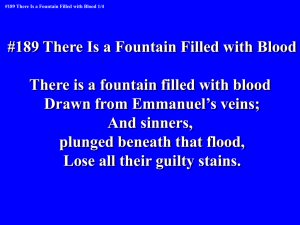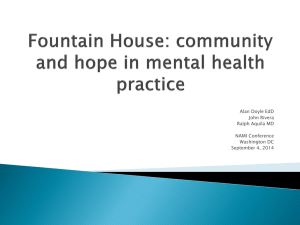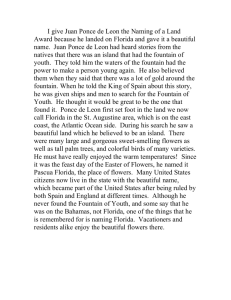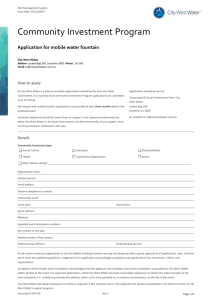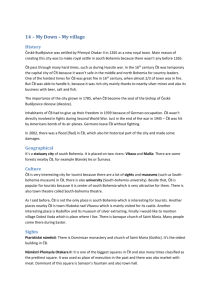THE BEST MONUMENTS IN THE CITY
advertisement
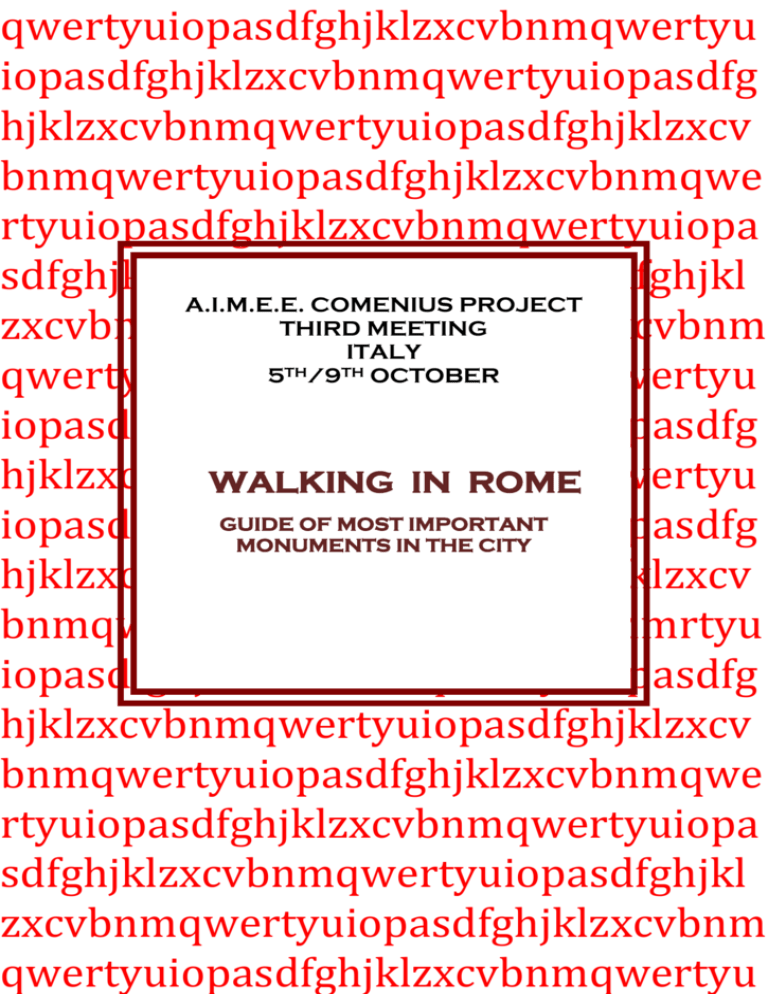
qwertyuiopasdfghjklzxcvbnmqwertyu iopasdfghjklzxcvbnmqwertyuiopasdfg hjklzxcvbnmqwertyuiopasdfghjklzxcv bnmqwertyuiopasdfghjklzxcvbnmqwe rtyuiopasdfghjklzxcvbnmqwertyuiopa sdfghjklzxcvbnmqwertyuiopasdfghjkl A.I.M.E.E. COMENIUS PROJECT THIRD MEETING zxcvbnmqwertyuiopasdfghjklzxcvbnm ITALY 5 /9 OCTOBER qwertyuiopasdfghjklzxcvbnmqwertyu iopasdfghjklzxcvbnmqwertyuiopasdfg hjklzxcvbnmqwertyuiopasdfghwertyu WALKING IN ROME GUIDE OF MOST IMPORTANT iopasdfghjklzxcvbnmqwertyuiopasdfg MONUMENTS IN THE CITY hjklzxcvbnmqwertyuiopasdfghjklzxcv bnmqwertyuiopasdfghjklzxcvbnmrtyu iopasdfghjklzxcvbnmqwertyuiopasdfg hjklzxcvbnmqwertyuiopasdfghjklzxcv bnmqwertyuiopasdfghjklzxcvbnmqwe rtyuiopasdfghjklzxcvbnmqwertyuiopa sdfghjklzxcvbnmqwertyuiopasdfghjkl zxcvbnmqwertyuiopasdfghjklzxcvbnm qwertyuiopasdfghjklzxcvbnmqwertyu TH TH OCTOBER 6TH 2014 SAINT PETER SQUARE SAINT PETER SQUARE has an elliptical shape and it’s surrounded by the beautiful columns that seem the arms of the Church stretched out to receive all the human beings. Above there are 140 statues of Saints. In the middle of the square there is the obelisk that is 25 metres high. From the square we can see the wonderful dome made by Michelangelo. VATICAN The Vatican has been the residence of the Popes since the end of the 14th century. On the tomb of the saint, which was found here, Emperor Constantine ordered to build the first Basilica of Saint Peter. During the Renaissance the Popes decided to build a bigger and majestic church. SAINT PETER BASILICA It’s the most important Church of Christianity. Two marble statues of S. Peter and S.Paul precede its front. On top there are 13 statues: Christ with his Apostles. At the centre there’s Loggia of benedictions where the election of the Pope is proclaimed. The great DOME, that was planned by Michelangelo, is visible from all the city. Inside there is the beautiful masterpiece of Michelangelo’s sculptur, the Piety:it’s the last embrace between Jesus and his Mother Mary. Above the S.Peter’s tomb is the altar, above the altar is the beautiful canopy realized by the great Italians artists Bernini and Borromini. Under this floor there are the tombs of many popes, also of Giovanni Paolo II. [ LENGHT 211.50 m / FRONT lenght 114 m – hight 45 m / NAVE – hight 45 m / DOME height out 136 m in 119 m / CANOPY lenght 187 m height 29 m ] SAINT ANGEL CASTLE The building looks like a fortess, but it was built in Roman age, like a tomb for the emperor Adriano. His current name comes from a legend tells of a miraculous event happened during a procession made to free Rome from the plague: an angel appeared in the sky and laid on the top of the building. In the place where the angel appeared was built a statue and the name of the edifice changed in St.Angel Castel. During the Middle Ages the Roman edifice was fortified and it was transformed into a castle. It was connected to the Vatican City with a long corridor said “Passetto”. The popes used the castle like a fortess, but also like a prison. Castle has got five plans: first floor with a wonderful helical stair; second floor said of the prison; third plan with two big courts; fourth floor for the pope's loft; fifth floor with a big terrace. Here there is the statue of Archangel in bronze and from which one can admire a beautiful view of the city. SAINT ANGEL BRIDGE S.Angel’s bridge is in front of Saint Angel Castle. It was built when Adrian, emperor of Romans, built his tomb. It is one of the most beautiful bridge on the Tiber, the river of Rome. On railings there are 10 marble statues of angels, realized from sculptor Bernini with his disciples. Each angel takes one symbol of Christ’s passion (column, scourges, crown of thorns, shroud, dress and the dice, nails, cross, sponge, lance) NAVONA SQUARE NAVONA SQUARE has a lengthened shape, because in this place there was the ancient stadium of the Roman emperor Domiziano where were developed the athletic competitions, the horse racing and perhaps the naval battles flooding the plaza. Many important buildings and two churches, S.Agnese e S.Giacomo of Spanish, are collocated here. At the center of the square there are three fountains: the Fountain of the Rivers, the Fountain of the Moor and the Fountain of Neptune who fights with octopus. FOUNTAIN OF RIVERS The FOUNTAIN OF THE RIVERS is the most important of the three fountains in Navona Square. It was planned by the sculptor Bernini in support of the obelisk. Around the cliff there are symbolic animals and the four statues represent the four continents known at the time of sculptor: Asia , Africa, America and Europe. RIO OF PLATA, symbol of America, has one arm up because, in the legend, it was built to defend the same fountain from the collapse of the church built by Borromini (the rival artist of Bernini). GANGE is the symbol of Asia and his oar allude to the navigability of this river. The statue on the horse is the river DANUBIO and alludes to the excellent breed of horses in Europe. The river NILE represents Africa and it has the head covered by a veil because the Nile’s sources were unknown at that time. PANTHEON SQUARE The name of this place is ROUND SQUARE because the most important building that is here, the Pantheon, has this shape. In the middle of the square was collocated a beautiful fountain with rocks, natural element and one of the Egyptian obelisk. PANTHEON The PANTHEON was a temple devoted to many divinities . After it became a Church devoted to Christian martyrs that was named “SANTA MARIA AD MARTYRES”. The plane of the building is a circle and the dome is an half sphere. On top of the dome, is situated an hole, whose diameter is about 9 meters. This allows to pass the solar light, the air, but also the rain. The water that enter in the Pantheon is carried with opportune holes in the floor, concave floor along the perimeter of the building . Since 1500 this building is a tomb of very important person: the big Italian artist Raffaello Sanzio and the Kings of Italy are buried here. COLUMN SQUARE The square is so called because in the middle there is the COLUMN ANTONINA. This column, erected in honor of Marcus Aurelius Antoninus, is realized in marble and is 30 meter high. It is narrated the victory of the Emperor against the Germans. Currently on top of the column is the statue of St. Paul that has taken the place of Marcus Aurelius and his wife Faustina. In front of column there is Palazzo Chigi, seat of the Presidency of the Council. TREVI’S FOUNTAIN The TREVI’S FOUNTAIN is the greatest fountain in Rome. Its big size (20m large and 26m high) is amazing because it is built in a small square. It was built around 1750. The sculpture is a tribute to the sea: they are statues of gods and marines elements. At the center, in the large central niche there is the statue of Ocean over a shell-shaped cart. They say that who wants to come back to rome, must throw a coin into the fountain but if you want that your wish will become true you must throw it behind you! So let’s go down to the fountain and …good luck!!! SPAGNA SQUARE The SPAGNA SQUARE is an alive and crowded place of the city. From this square you can enter the most famous streets for the shopping of Rome: Condotti Street , Frattina Street, Corso Street and others. It has a strange shape of a butterfly and its particularity it is the presence of the beautiful stairway of Trinità dei Monti . STAIRWAY OF TRINITÀ DEI MONTI The beautiful STAIRWAY OF TRINITÀ DEI MONTI connects the high zone of the church with the square below. The stairway, realized in 1725, has the curvilinear ramps that welcomes those that climb. There are 138 steps. FOUNTAIN OF THE BARCACCIA The fountain was realized by Bernini in the 1600’s. It is situated at the foot of the stairs of Trinità dei Monti. It is made with marble and it has the shape of a boat, a typical boat that carried goods on the river Tevere . The boat is situated in a pool under the level of the street and it seems to sink (maybe to remember the episode of a boat that stranded during the flood in 1598 VENICE BUILDING AND SQUARE The square is named after the Palace of Venice which was built in 1455 by the venetian Pope, Paolo II. It is the first Renaissance palace in Rome. The current appearance of the square is the result of project of realization of the monument to Victor Emanuel II, king of Italy from 1885 to 1911. THE MONUMENT OF VITTORIO EMANUELE II The big monument is also know as Altar of Fatherland or Vittoriano. It was built between the end of 1800’s and the beginning of 1900’s in honour of the King of Italy. It is 81 metres heigh and it is richly decorated with symbolical reliefs and statues in marble and in bronze. FORUMS The forum was a place situated in the centre of the city: in this area was the political, administrative, social and religious life of Rome. It is like a square with many important buildings: temples, basilicas, arches and place. The ROMAN FORUM was realized since the foundation of the city. The IMPERIAL FORUMS were built by many roman emperors: Augusto, Nerva, Traiano e Adriano. On the wall in front of the Imperial Forums there are 4 marble stables that indicate the extension of old Rome from the first 7 kings to the Emperor Traiano. THE COLISEUM The real name is ANPHITEATRE FLAVIUS because it was made by the Flavi imperial family, from 72 to 80 A.D. The Coliseum is 50 metres high; it is oval; the front consists of 4 levels: in each of them there are 80 arches. The Coliseum was a building where the combat shows were held. The Roman population really enjoyed this kind of show.
